
1742 Gravelot Edition
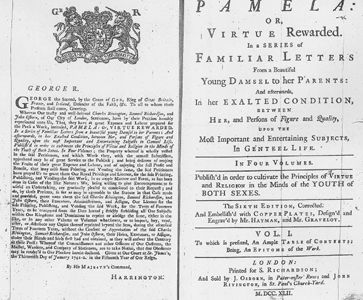
While not a huge commercial success, this 1742 printing of Pamela is by far the most famous illustrated edition.
It was published by Samuel Richardson himself, who had commissioned
illustrations by Hubert Gravelot and Francis Hayman. The novel was published
in a deluxe form. It was the sixth edition of the original novel and the third edition of the sequel to Pamela's story. As such,
the illustrations continue beyond Pamela's marriage to Mr. B, and include many more scenes of domestic happiness than
many other editions. With over twenty-five engravings, this edition also stands as the most heavily illustrated Pamela
edition of the eighteenth century.

 
 
 |

 
 
 |

 
 
 |

 
 
 |

 
|

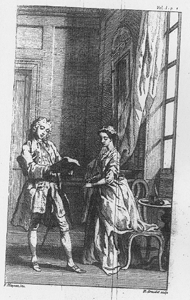 |
Never one to allow Pamela her privacy, Mr. B's character is established in the first illustration, where we see him reading one of her letters. As his servant, Pamela has no choice but to hand over her correspondence to her parents. |
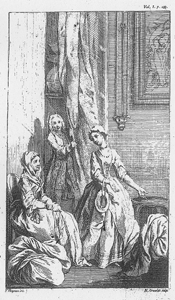 |
But Mr. B doesn't stop at just reading Pamela's letters; he also eavesdrops on her conversations with Mrs. Jervis. Here, he listens as Pamela shows her "bundles" (bags full of clothing she's made as well as clothing her old mistress gave to her) to her elder friend. |
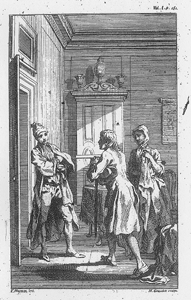 |
Concerned for his daugher's welfare, Mr. Andrews travels to Mr. B's estate to check on her. Upon his arrival, he is told that she is in London. Unbeknownst to him, however, Pamela has been brought to a home in the country and is being held there against her will. |
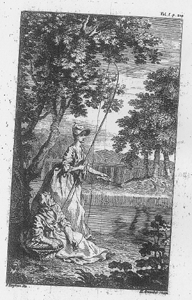 |
We never read of Pamela going fishing with Mrs. Jewkes while confined, but Gravelot and Hayman must have imagined that would be one of the ways they spent their leisure time. |
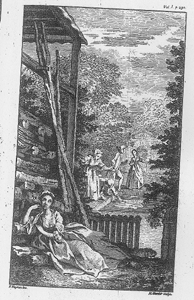 |
Catching a fish was not enough to ease Pamela's fears, however, and here we see the aftermath of the fateful night she contemplated suicide. As the others frantically fish her dress out of the pond, Pamela sits forelorn, hidden from their view. |
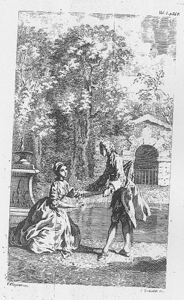 |
Moved by Pamela's sincere desire to remain virtuous and chaste, as evidenced by her wish to kill herself rather than succumb to his advances, Mr. B attempts to reconcile with Pamela. |
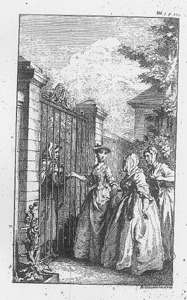 |
Released from her own imprisonment, here we see Pamela visiting another woman behind bars, the fortune teller. After rubbing her too-fine, too-white hand with dirt to make its lines visible, Pamela learns that the future doesn't have anything bright in store for her. |
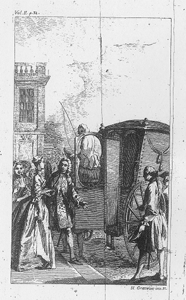 |
Having completely forgiven Mr. B, Pamela enters into a relationship with him. Although it was of course not her intention, the relationship also raises her social status. Being helped into a carriage by Mr. B is one sign of her newly elevated position. |
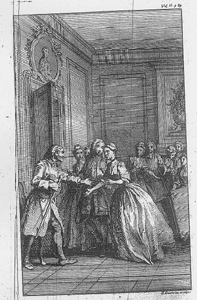 |
Mr. Andrews returns to Mr. B's home, this time met by his daughter. In her surprise at her father's visit, she knocks over the card table, an act that is depicted in every edition we look at here. |
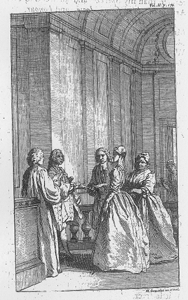 |
Here, we see Pamela and Mr. B getting married by Mr. Williams. Mrs. Jewkes is in attandence, as is Mr. Peters, while Nan peers in from the door. With the illustrations for this edition coming both the first and the second parts of Pamela, the marriage here comes only a third of the way through the text. |
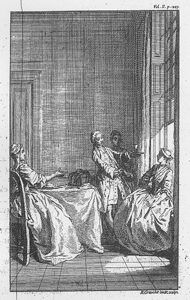 |
Now Mrs. B, Pamela tries to settle into life as an upper-class wife. Her sister-in-law Lady Davers, however, does not want to make that easy, as she here asks Pamela to get her a glass of wine, when fetching wine for the guests is clearly a job for Beck, the servant. |
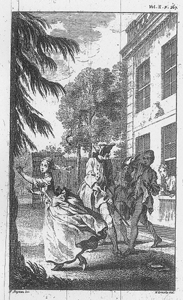 |
No longer able to endure Lady Davers' abuse, Pamela flees from the house, as Lady Davers watches from the window and two of her servants attempt to catch her renegade sister-in-law. |
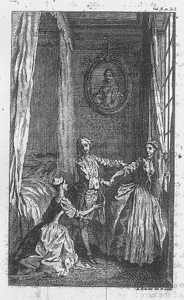 |
Desiring a contented domestic existence, Pamela begs Lady Davers to forgive her. Luckily, though, Mr. B is able to use his patriarchal entitlements to full advantage and turns the tables, making his sister apologize to his wife. |
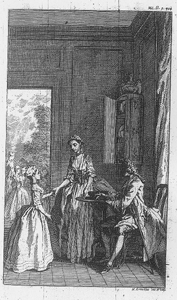 |
Now that she has made her peace with Lady Davers, Pamela meets the rest of the family. Here, her new niece asks if Pamela will be her aunt and Pamela, demonstrating her motherly instincts already, answers with an enthusiastic affirmative. |
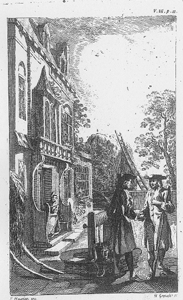 |
Pamela watches as her father and Mr. Longman have a talk about Mr. B. The men's business takes place out of her earshot. |
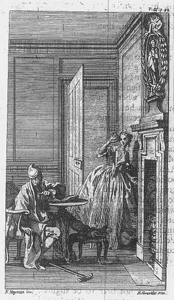 |
Learning that her father is ill with rheumatism, Pamela goes to see him. She shows enormous patience in dealing with her ill father. |
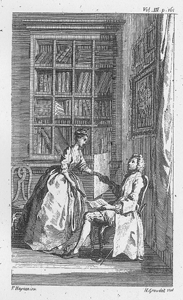 |
Their relationship had begun with Mr. B stealing Pamela's letters; now, as a married couple, they look together at a letter he holds in his lap. |
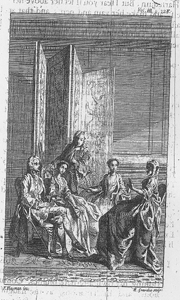 |
Pamela enjoys tea with her friends, among whom she can now count Lady Davers. |
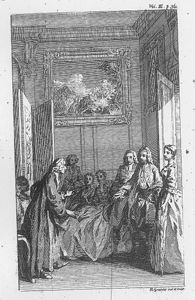 |
Pamela has a heartfelt visit with Mr. Williams and Mr. Adams, as her friends look on. |
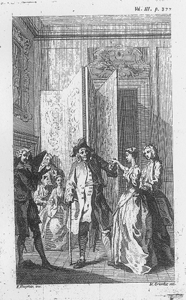 |
Sir Jacob put Pamela through a thorough inspection, looking her up and down and then turning her around. He pronounces her a "charming specimen." |
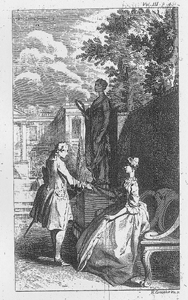 |
Knowing the trouble that letters can cause, Pamela asks that Mr. H return a note written by her niece. |
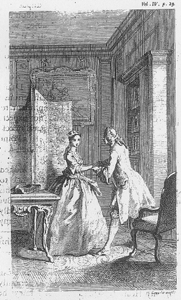 |
After a spat, Mr. B forgives Pamela, to her great joy. These scene of their reconciliation is depicted very simply: a hat on the table, a sword in Mr. B's pocket, his taking Pamela by the hand. |
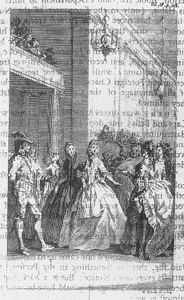 |
The spareness of the previous scene is constrasted to the business of this next engraving, where Pamela is in attendance at a ball, surrounded by party-goers. |
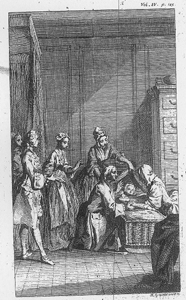 |
After a separation, Mr. B sees his baby daughter. The happy family, as described by Richardson, were joined "in one Thanksgiving". |
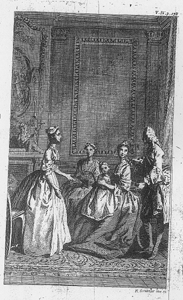 |
Pamela holds her baby daughter on her lap, as Mr. B stands behind them, his face turned towards hers. The meeting of their gaze shows a special intimacy between them even as there are others in the room. |
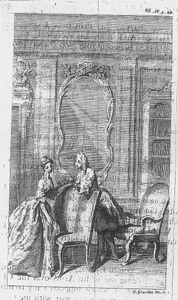 |
Pamela and Mr. B have a serious conversation, as Pamela asserts her aversion to polygamy. It is all, of course, a misunderstanding. |
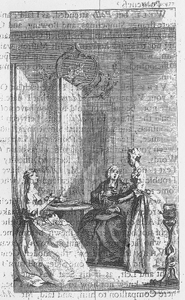 |
Pamela has tea and a talk with Mr. Adams and Polly Barlow. |
Information on Gravelot and the sixth edition of Pamela from The Age of Hogarth: British Painters Born 1675-1705 by Elizabeth Einberg and Judy Egerton, published by The Tate Gallery with the assistance of J. Paul Getty Trust in 1988.